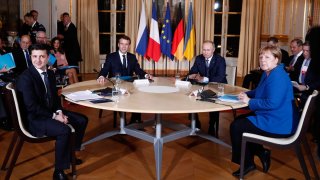
The presidents of Ukraine and Russia agreed Monday to revive the peace process on the bloody separatist conflict in eastern Ukraine and exchange all prisoners, but they failed to resolve crucial issues such as a timeline on local elections and control of the borders in the rebel-held region.
At the first meeting between new Ukrainian President Volodymyr Zelenskiy and Russian President Vladimir Putin, the two leaders failed to find a compromise to bring an end to the 5-year-old war that has killed 14,000 people, emboldened the Kremlin and reshaped European geopolitics.
But they did agree to try again in four months to find new solutions, said French President Emmanuel Macron, who mediated the talks along with German Chancellor Angela Merkel.
“There are disagreements, especially on timeline and next steps. We had a very long discussion on this,” Macron said.
The summit was the biggest test yet for Zelenskiy, a comic actor and political novice who won the presidency this year in a landslide -- partly on promises to end the war.
The 2015 peace agreement helped to reduce the intensity of the fighting but Ukrainian soldiers and Russia-backed separatists have continued to exchange fire across World War I-style trenches along a front line that slices through eastern Ukraine.
While Zelenskiy still enjoys broad public support, he has been embarrassed by the scandal around his discussions with U.S. President Donald Trump that have unleashed an impeachment inquiry in Washington. The U.S. is an important military backer for Ukraine, which is hugely out-gunned by Russia.
U.S. & World
While the U.S. was never part of this peace process, U.S. backing has strengthened Ukraine's overall negotiating position with Russia in the past. Now that support is increasingly in doubt, after the Trump administration froze military aid earlier this year and is increasingly focused on Trump's re-election bid. With U.S. influence waning around the world, many in Kyiv see one clear winner: Russia.
Karmanau reported from Kyiv. Sylvie Corbet and Angela Charlton in Paris, Inna Varenytsia in eastern Ukraine, Daria Litvinova in Moscow and Geir Moulson in Berlin contributed.



